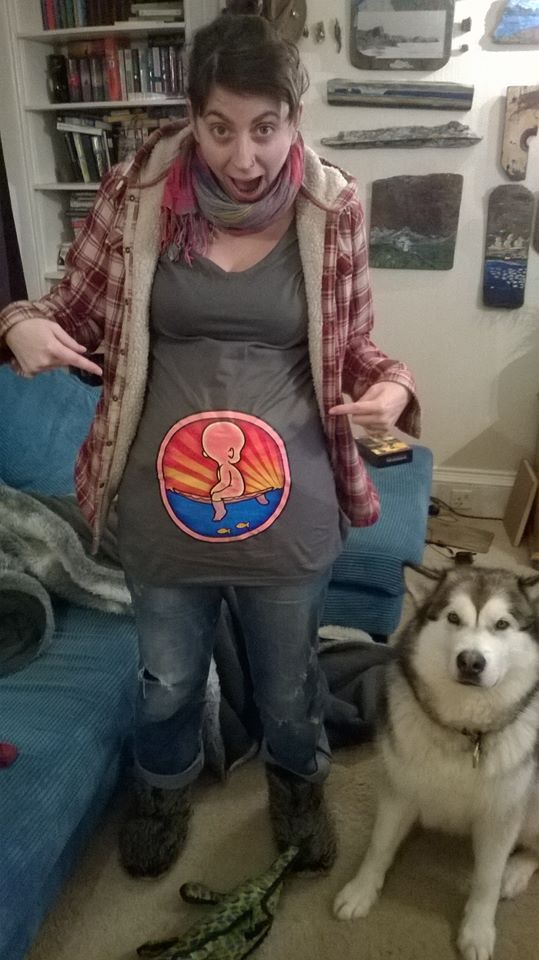Postgrad and Pregnant
What is it like to go through pregnancy as a PGR? Stuart previously wrote about his experience of being a father during his PhD studies, but today we are looking at it from the mothers side. In this multi-guest post we start by hearing from Mary Beth Kneafsey, who takes us through official UofG policy and gives practical advice to perspective mothers. Next we hear from recently completed (viva-pending) PGR Christina Berry, who tells us her personal story of starting a family. Finally, it is over to you! We are hoping you will fill in the last part of this post by sharing your experiences of pregnancy and motherhood in the comments below. Everyone's journey is different, with some harder/easier than others, but one thing is for sure, if we share our stories we can learn from, and hopefully help, each other.
Mary Beth Kneafsey—PGR strategy manager:
PGRs can suspend their study to take maternity, adoption or shared parental leave. Many funders provide a paid period of leave, as do internal university scholarships. Students may also be able to take a short period of paternity leave. The situation can be complicated, depending on your funder and your visa status, and the best place to go for advice on these issues is your Graduate School. They will be able to tell you about the process, as well as whether your funder will cover leave. As part of its Athena Swan (gender equality) work, the University is looking at how we support PGRs who are looking to take maternity/paternity/adoption leave, including how we provide information on this, policies to allow for shared parental leave and mentoring/support for PGR returners. We’re keen to hear suggestions from people who have had either positive or negative experiences here or in other institutions.
Christina Berry—recently completed PhD candidate and new mum:
In hindsight, making the decision to start trying for a baby during my PhD was bonkers. But I was 27 years old and married, it was the next logical step—we just didn’t bank on it happening so quickly! I remember the first time I thought I might be pregnant; I was sat in the lab extracting DNA when I started feeling a bit weird. I must have taken five different tests that day, sat in the toilet at work with my Boots bag and a litre bottle of water. That’s when I received my first positive result. In the beginning everything was great, I didn’t suffer from morning sickness and I was able to carry on with my lab work. While telling my supervisor and funding body (BBSRC) was terrifying, they all seemed to take it well. So, for a while, everything was shiny.
It was only once I started showing enough to be obviously pregnant that things became a bit weird. I would walk the hallways with my bump proudly visible and fellow academics would avoid me, yes actually AVOID me. It felt like most of my fellow PhD students looked at me with disapproval, often turning around to walk the other way when they saw me in the corridor. But the worst reaction was from some female members of faculty, who would eye me with a look of disgust on their faces, clearly thinking I had ruined my career/life. Perhaps they were worried they might catch it by being in my vicinity? Now don’t get me wrong, no one ever said anything negative to my face, you are merely reading my interpretation of the situation and I received plenty of support from close friends and colleagues (particularly with lab work when I was huge!). Towards the end of my pregnancy other academics started using terms like ‘post-natal depression’, insinuating that this was likely to happen to me, and remarking that I probably wouldn’t finish my PhD (jokes on you). For all the progress that has been made, it’s clear that there is still a lot of stigma attached to pregnancy in academia and this is something to bear in mind.
Finally, the issue of childcare became a very real and scary prospect, having no family locally meant that I had one of three options: 1) put my child in full-time care (let’s face it, impossible on a PhD salary); 2) go back part time; or 3) attempt to work from home for half the week. I ended up taking option three, despite the critics.
Having a baby during your PhD is doable, ridiculously hard work (especially if your baby never sleeps like mine), but doable. I think the aspect that I wasn’t quite prepared for was the feeling of guilt I would have. When I was at home spending time with my son I would feel guilty about not working on my PhD, but when I was at work I would feel guilty about not being with my son. It was pretty early on into being a mother that I discovered academia wasn’t for me, I missed having a set salary and job security and so, having finished my PhD, I am now back teaching high school Biology: happy, guilt-free and with a solid income.
Any stories to share or advice for people thinking about starting a family (or who find themselves pregnant) during their PGR studies? Please comment below or or on Twitter (@UofG_PGRblog).
Feature image: Sonogram by rchristie/Ryan (CC BY-NC 2.0), via Flickr.
This post was edited by James D. Burgon.







